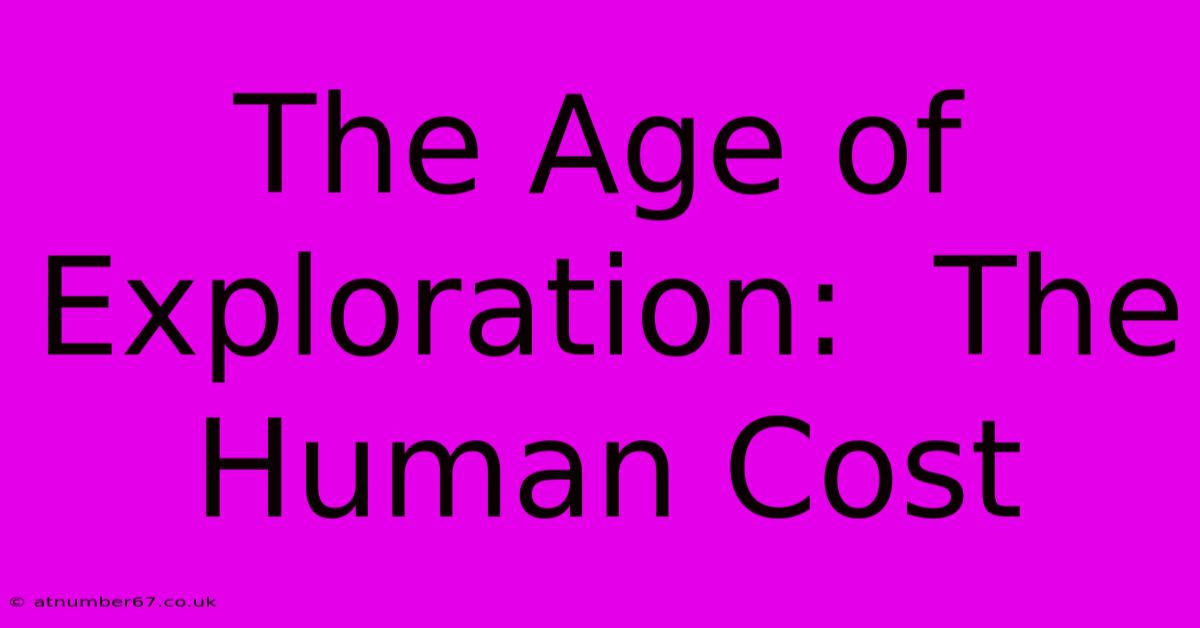The Age Of Exploration: The Human Cost

Table of Contents
The Age of Exploration: The Human Cost
The Age of Exploration, a period spanning roughly from the 15th to the 17th centuries, is often romanticized as a time of daring voyages, grand discoveries, and the expansion of European influence across the globe. However, behind the glittering facade of adventure lies a brutal reality: a devastating human cost borne disproportionately by indigenous populations and enslaved peoples. This era, while undeniably shaping the modern world, was stained with violence, disease, and exploitation.
The Devastating Impact of Disease
One of the most insidious aspects of European exploration was the unintentional introduction of devastating diseases to previously isolated populations. Smallpox, measles, influenza, and typhus, to which Europeans had developed some immunity, ravaged indigenous communities across the Americas, Africa, and the Pacific Islands. These diseases decimated entire populations, leading to societal collapse and facilitating European conquest. The lack of prior exposure meant indigenous peoples had virtually no natural defenses, leading to catastrophic mortality rates. This biological warfare, while unintentional in some cases, played a significant role in the success of European colonization.
The Demographic Catastrophe in the Americas
The impact in the Americas was particularly severe. Scholars estimate that the indigenous population of the Americas plummeted by as much as 90% in the centuries following European contact, primarily due to disease. This demographic catastrophe reshaped the continent, leaving a void that was filled, in many cases, by forced labor and the transatlantic slave trade.
The Brutal Reality of Enslavement
The Age of Exploration was inextricably linked to the transatlantic slave trade. Millions of Africans were forcibly removed from their homes, subjected to horrific conditions during the Middle Passage, and enslaved in the Americas. The demand for labor in the burgeoning sugar, tobacco, and cotton industries fueled this brutal system, resulting in unimaginable suffering and the lasting scars of racial inequality that persist today.
The Middle Passage: A Voyage of Terror
The Middle Passage, the transatlantic voyage that transported enslaved Africans to the Americas, was characterized by unimaginable cruelty. Overcrowding, disease, starvation, and violence were commonplace, resulting in staggering mortality rates. The psychological trauma inflicted upon those who survived the journey is almost impossible to comprehend.
Exploitation and Colonialism: A Legacy of Suffering
Beyond disease and enslavement, the Age of Exploration brought widespread exploitation and colonialism. Indigenous peoples were dispossessed of their lands, their cultures suppressed, and their resources plundered. European powers imposed their systems of governance and economic structures, often leading to widespread poverty, inequality, and social disruption.
The Destruction of Indigenous Cultures
The destruction of indigenous cultures was a systematic process, often involving the suppression of languages, religious practices, and traditional ways of life. This cultural genocide had profound and lasting consequences, contributing to the marginalization and disenfranchisement of indigenous communities worldwide.
Reframing the Narrative: Beyond Romance
It's crucial to move beyond a romanticized view of the Age of Exploration. While acknowledging the achievements of exploration in terms of geographical knowledge and technological advancements, we must confront the brutal realities of this period. Understanding the devastating human cost is essential to fostering a more accurate and nuanced understanding of world history and to promoting social justice and reconciliation in the present day.
A Call for Critical Examination
The legacy of the Age of Exploration continues to shape the world we live in today. By critically examining the human cost of this era – the disease, enslavement, and colonial exploitation – we can better understand the complexities of global history and work towards a more equitable and just future. Acknowledging this dark chapter is not about erasing the past but about learning from it and preventing similar atrocities from occurring again. It's about recognizing the enduring impact on indigenous communities and peoples of African descent and working toward reparative justice.

Thank you for visiting our website wich cover about The Age Of Exploration: The Human Cost. We hope the information provided has been useful to you. Feel free to contact us if you have any questions or need further assistance. See you next time and dont miss to bookmark.
Featured Posts
-
Shah Rukh Khans Net Worth The Power Of Bollywood
Apr 04, 2025
-
Naomi Watts Raising A Grounded Daughter Kai
Apr 04, 2025
-
Kai Cenats Net Worth His Journey To Financial Freedom
Apr 04, 2025
-
Branko Babic From Humble Beginnings To Mega Wealth
Apr 04, 2025
-
The Secret To Ben Afflecks Massive Wealth
Apr 04, 2025
